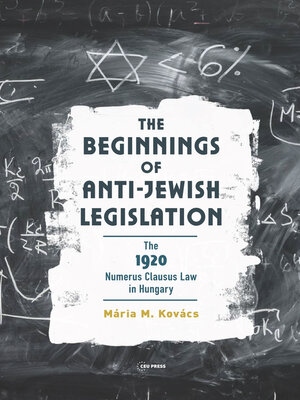The Beginnings of Anti-Jewish Legislation
ebook ∣ The 1920 Numerus Clausus Law in Hungary
By Mária M. Kovács

Sign up to save your library
With an OverDrive account, you can save your favorite libraries for at-a-glance information about availability. Find out more about OverDrive accounts.
Find this title in Libby, the library reading app by OverDrive.



Search for a digital library with this title
Title found at these libraries:
| Library Name | Distance |
|---|---|
| Loading... |
The Nazi 1933 Civil Service Law and the 1935 Nuremberg Laws are often considered the first anti-Jewish decrees in interwar Europe. Mária M. Kovács convincingly argues that Hungary's numerus clausus law of 1920, which introduced a Jewish quota at Hungary's institutions of higher learning, was, in fact, interwar Europe's first antisemitic law. By defining—and discriminating against—Jews as a separate "racial" or "national" group, it abrogated the principle of equal rights that had been enshrined into law; as such, it marked an abrupt reversal of Jewish emancipation in Hungary. Moreover, the numerus clausus law set the stage for subsequent "Jewish Laws" (in the late 1930s and early 1940s) that sought to solve Hungary's "Jewish Question" by means of extraordinary legal measures that targeted Jews alone. This book examines the origins and implementation of the numerus clausus, as well as the attempts to dampen its impact on Hungary's international reputation, focusing on the debates surrounding it promulgation (1920), its modification (1928) and its eventual application to other areas of Jewish life (1938–45).







